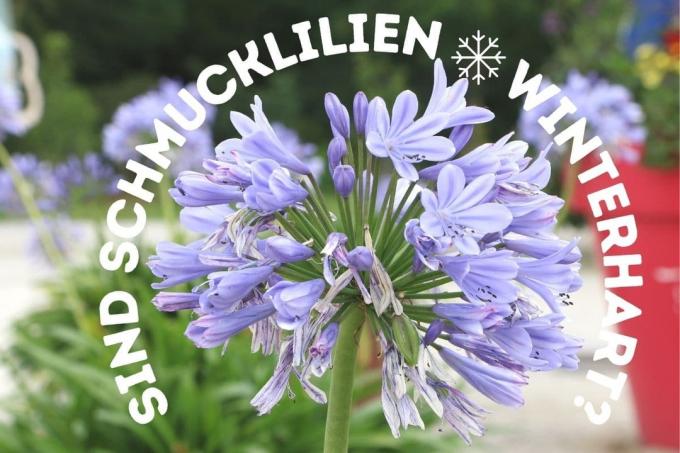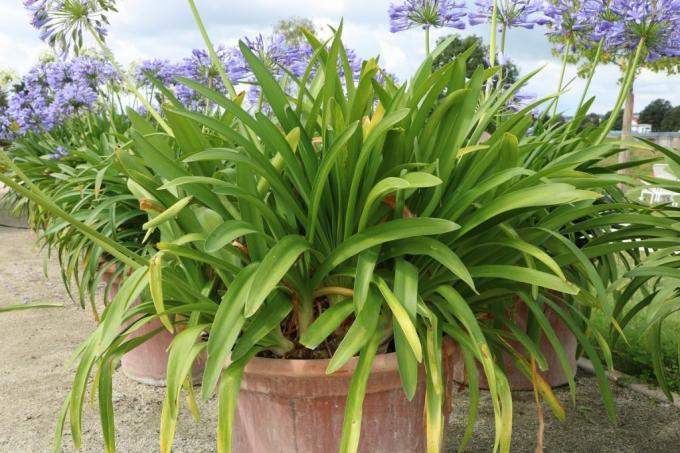
table of contents
- Origin of the ornamental lilies
- Bucket keeping
- Deciduous ornamental lilies
- Important temperatures
- frequently asked Questions
Decorative lilies are divided into deciduous and evergreen species. The evergreen species are often planted in pots. The deciduous also thrive in the garden, but is agapanthus hardy there too?
In a nutshell
- Agapanthus is a blue or white flowering perennial with rhizomes
- Suitable for keeping in pots as well as planted in the garden bed
- Differentiation between evergreen and deciduous species
- evergreen species not hardy, deciduous representatives conditionally
- generally overwinter in a cool place, protect planted specimens with mulch and brushwood
Origin of the ornamental lilies
All ornamental lily species come from South Africa and therefore grow in milder regions. However, there are species that are more native to mild coastal regions and those that have adapted to cooler mountain climates. Nevertheless, they are not used to the harsh winters of the temperate climates.
Bucket keeping
Evergreen species like Agapanthus africanus are not suitable for outdoors. You are with us insufficient or not winterproof at all. It is necessary to plant them in a pot and hibernate indoors in cooler temperatures.

The same is true for Art Agapanthus praecox and all crosses of these species. They must not be watered too much in the winter quarters, the roots could rot. In addition, there is no fertilization. If there is plenty of light in the winter quarters, the ornamental lilies will bloom faster in the following year.
Note: Even if evergreen agapanthus are not hardy, they must not be overwintered too warm. They then bloom poorly or not at all.
Deciduous ornamental lilies
The deciduous species of the African Lily grows best outdoors in a sheltered place with a mild climate. This is agapanthus only partially hardy. That means that it does not tolerate severe frosts, but with a few minus degrees at sufficient winter protection gets along well.

However, this does not apply to Potted plants. The substrate freezes quickly in pots, so that the rhizomes get too much frost. Young plants are particularly vulnerable to frost outdoors, so they should be well protected in the first winter. Only when they have grown sufficiently do they tolerate the cold better. In very cold areas, it is better to dig up some rhizomes in autumn and overwinter in a pot indoors. They are planted out again in spring.
Important temperatures
- both species generally overwinter quite cool
- indoors at about five to zero degrees
- well protected and hardy outdoors at temperatures down to minus five degrees (only deciduous Agapanthus species)
- Temporary minus 15 degrees are tolerated (only deciduous species)
frequently asked Questions
This is not easy because the flowers of all species are blue-purple. White flowers are also found in many breeds. The foliage is always striped green or green and white. The main difference is that deciduous species lose their foliage in winter. When buying, you should pay close attention to the label so that the plant that has the desired properties is also purchased.
It is important to have a location that is protected from waterlogging, strong winds and temperatures that are too low. Since the deciduous ornamental lilies shed their leaves, they cannot freeze to death. The rhizomes are protected by a layer of leaves or brushwood. A lot of snow does not harm the plant as it insulates. But the plant must not get wet.
In addition to the evergreen species Agapanthus praecox and the African African Lily is also the deciduous one Agapanthus campanulatus popular. In addition, there are numerous popular strains and hybrids that have arisen from crossbreeding.



